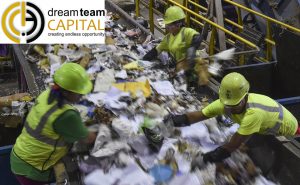If you are considering starting a recycling business, purchasing one, or expanding…developing a business plan is key. DTC developments are used regularly to create a vision for businesses, secure funding, secure non-repayable business grants, attract team members and/or manage the company. Let DTC assist you with your Recycling Business Plan today!
The Recycling Sector Overview
South Africa is a world leader in the recycling sector. South Africa has one of the most effective recycling industries worldwide and according to a Plastics SA report, SA’s recycling rate is also a step ahead of Europe. SA currently recycles 46% of all plastic (higher than most countries), 70% of paper, 72% of metal, and 70% of glass. This means the country has one of the most effective recycling industries worldwide.
The country reportedly has a minimum of 300 recycling companies that vary in size, ranging from smaller enterprises to larger scale companies. According to Aurora sustainability blog, (which focuses on safety environmental research), South Africa generated 42 million tons of waste in 2020. With the ever-rising global temperatures, people are becoming aware of the impact pollution has on the planet.
Recycling in itself enables businesses to use greener technologies, improve production to conserve energy, reduce pollution, and eliminate unwanted waste. Recycling businesses are relatively easy to set up, they has a positive environmental impact, and are part of a highly successful sector.
The essential elements for a well-structured Recycling Business Plan include:
•Executive summary: This is an overview of your business and plans. It is first in your plan to acquaint the reader with the contents of the plan and is one to two pages.
•Body: This section will cover your marketing and sales strategy, operational plan, milestones and metrics for success.
•Company and management summary: This section describes your current team and future additions to it. You will also provide an overview of your legal structure, business premises, and history if you are already operating.
•Financial plan: Your business plan requires a financial forecast. DTC will tell you what to include in your financial plan.
•Financial projections: Financial projections provide a clear understanding of your financial situation and to discover your full profit potential. These include the management account, income statement, balance sheet, cash flow, cash forecast, break even analysis, loan amortisation schedule, and fixed asset schedule. Ratios, graphs, and calculations are included.
•Annexes: Additional information needed by funders in an application. These may include management CV’s and references, quotations, and tax returns.
 At DTC…
At DTC…
We understand the complexities of the requirements and criterion for an accurate and custom business plan. If using the plan to raise funding and/or non-repayable business grants, we guide you through the process and provide access to our expansive network of funders. These include venture capital companies, private equity companies, angel investors, banks, Government BBBEE initiatives, Silicon Cape investment organisations, rent to own asset funding companies, crowd funds, and more!
Contact us – for more information & assistance.

